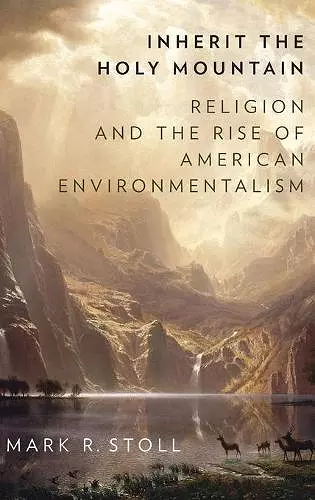Inherit the Holy Mountain
Religion and the Rise of American Environmentalism
Format:Hardback
Publisher:Oxford University Press Inc
Published:25th Jun '15
Currently unavailable, and unfortunately no date known when it will be back

Historians of American environmentalism have long given religion either a negligible role or a negative one in the development of the field. According to the standard view, Christianity fostered attitudes hostile or indifferent to nature, with Protestantism the worst offender. While virtually all leading environmental figures did eventually leave organized religion, a large majority however had religious childhoods, usually in Reformed Protestant churches, and often counted clergy as close relatives. And although popular support for conservation and environmentalism was relatively non-denominational, Congregationalists provided the foundational ideas of conservation, while the rise and decline of environmentalism as a powerful national movement coincided with the prevalence of Presbyterian leadership. By tracing the history of American environmentalism from a perspective that puts religion at the center rather than the margins, Mark Stoll opens up a fundamentally new and much needed narrative in environmental studies. Inherit the Holy Mountain argues against the divide between religion and American environmentalism, demonstrating how religion necessarily provided environmentalists with deeply-embedded moral and cultural ways of viewing the world giving content, direction, and tone to the environmental causes they espoused. The book demonstrates how individuals' denominational origins corresponded with characteristic sets of ideas about nature and the environment, with each denomination fostering a distinctive culture with its own moral framework and its own placement of humans within the natural world. Stoll also demonstrates how each denomination also fostered a distinctive aesthetic reaction to nature, beginning each chapter of the book with an analysis of a representative work of art. Inherit the Holy Mountain also provides insight into the possible future of environmentalism in the United States, concluding with an examination of the current religious scene and consideration of what it may tell us. Whatever form the response to these problems will take in the twenty-first century, Stoll says, it will look very different, with different values, goals, and styles of leadership, than it did when the children of the Reformed churches created and led it.
If the geographic region of focus is the United States, then the book is mandatory. The impressive amount of data covered in its pages, and the cohesive narrative that contextualizes and analyzes this data, cannot be captured in a 1,600-word book review. Scholars owe Stoll a debt of gratitude for the 30 years of dedication to crafting this thorough treatment of the impact religion has had on environmentalism in the US. This gratitude should begin with the assignment of this book in graduate seminars devoted to interactions between religion and nature, where it can provide a shining example of scholarship toward which future leaders of the field should aspire. * Todd LeVasseur, Journal for the Study of Religion, Nature and Culture *
Spanning five centuries and encompassing religious and enviromental history with a heavy dose of art history, Inherit the Holy Mountain is the product of extensive research and offers a sweeping cultural reinterpretation of the history of American enviromentalism. * Luke Manget, Agricultural History *
He has painted such a rich description of religion in the lives and ideas of American environmentalists that readers will be struck by new insights and want more information about interactions between religion and environmental history. One need not agree with all of his conclusions to appreciate the quality of his research and be excited about the scholarship it will inspire as others respond to his ideas. * Religion *
[An] insightful religious history of environmentalism. * Vincent J. Miller, America Magazine *
It provides a detailed and fascinating genealogical analysis of the religious origins of American environmentalism. This is an impressive, provocative work of synthesis and original scholarship that enriches greatly our understanding of the history of the American environmental movement by placing religion at its core. * William Van Arragon, Fides et Historia *
Mark has written a book that has the potential to change the way environmentalists think about religion and the way religious people think about environmentalism. * Constance M. Furey, H-Environment *
This book grafts American religious history onto American environmental history, merging two distinct narratives, and it richly illustrates their themes with American art history to create a provocative, insightful hybrid. * Todd M. Kerstetter, The Journal of American History *
In Ecology in the 20th Century: A History (1989) historian Anna Bramwell gave the following short characterization of the (radical) environmentalist: 'As well as being saved, he is a protestant.' Bramwell did not elaborate on her provocative statement but now the gap has been filled by this splendid book by Mark Stoll. * Tijdschrift voor Geschiedenis *
Mark Stoll's Inherit the Holy Mountain is a fascinating, compelling, and enlightening journey through American history that interweaves religion with environmental preservation. Stoll skillfully narrates the nuanced roles of Calvinists, Congregationalists, Unitarians, and Presbyterians along with the voices of African Americans, Catholics, and Jews in conserving landscapes. Anyone interested in how and why American religious traditions have been so significant in setting aside forests and parks, saving wildlife, and mitigating urban pollution will want to read this book. * Carolyn Merchant, University of California, Berkeley, author of The Death of Nature; Ecological Revolutions; and Reinventing Eden *
a must read ... He provides a panoramic survey, bringing to the discussion a wealth of detailed information, insights, and revelations about this generally neglected subject. ... This book will be of interest in numerous disciplines, including art history, conservation and environmental studies, and religion. * L. E. Sponsel, CHOICE *
Stoll's book is an important contribution to our understanding of the religious roots of environmentalism * David S. Bovee, American Historical Review *
ISBN: 9780190230869
Dimensions: 239mm x 160mm x 33mm
Weight: 680g
424 pages